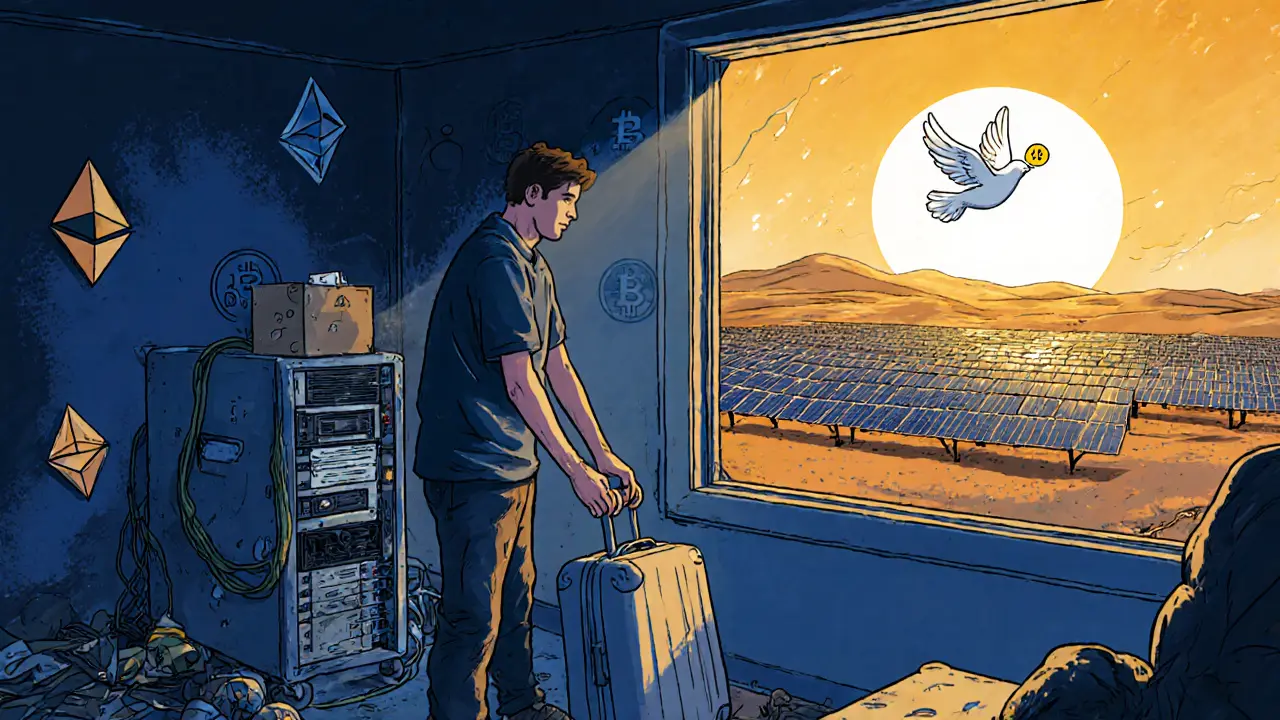Algeria Bans Cryptocurrency Mining Over Energy Crisis
Crypto Energy Calculator
Algeria's electricity grid operates at 95-100% capacity during summer. Cryptocurrency mining consumed 15-20 MW during peak hours (enough for 15,000 homes).
Grid Impact
0 MW used by mining
(Algeria's peak grid capacity: 95-100%)
Household Comparison
0 Algerian households powered
(Subsidized rate: $0.035/kWh)
Cost to Mine: $0 at Algeria's subsidized rate
For comparison: One month of electricity for a typical Algerian household costs $1.58
Algeria didn’t just restrict cryptocurrency mining - it outlawed it entirely. On July 24, 2025, Law No. 25-10 went into effect, making it illegal to mine, trade, hold, or even promote any form of cryptocurrency in the country. The government didn’t just slap on fines. It added prison time. And the reason? Not just fear of fraud or financial chaos. The real trigger was energy.
Why Algeria Cracked Down on Mining
Algeria’s electricity grid is already stretched thin. During summer, when temperatures hit 40°C and air conditioning runs nonstop, the grid hits 95-100% capacity. That’s not a glitch - it’s the norm. And somewhere in the shadows, hundreds of mining rigs were quietly sucking up power. According to SONELGAZ, Algeria’s national power provider, unauthorized mining operations were pulling in 15-20 megawatts during peak hours in 2024. That’s enough to power nearly 15,000 homes. For a country that still struggles to keep lights on in some neighborhoods, this wasn’t just wasteful - it was dangerous. The government’s math was simple: one Bitcoin mined uses about 1,500 kWh. That’s the same amount of electricity a typical Algerian household uses in a month. With residential electricity subsidized at just $0.035 per kWh - less than a quarter of the global average - mining became a cheap, high-reward hustle. But it came at the cost of everyone else’s power.What the Law Actually Bans
This isn’t a half-measure. Law No. 25-10 doesn’t just target big mining farms. It hits everyone.- Running a GPU rig in your basement? Illegal.
- Buying Bitcoin on a foreign exchange? Illegal.
- Holding crypto in a wallet? Illegal.
- Posting a TikTok about Ethereum? Illegal.
- Using a VPN to access crypto platforms? Also illegal.
How Enforcement Works
The government didn’t wait for complaints. It built a surveillance system. Special cyber units in the National Gendarmerie now monitor electricity usage patterns. If a warehouse or apartment building shows power consumption 30-50% higher than similar properties - especially during off-hours - inspectors show up. No warrant needed. Just a spike in usage, and your equipment is confiscated. In August 2025, a university student in Oran lost seven mining rigs after a surprise inspection. Another case in Algiers involved a small business owner who ran 12 ASIC miners in his garage. He was fined and sentenced to six months in prison. Even social media isn’t safe. Influencers who posted “how to mine crypto” videos have been summoned by police. Educators report avoiding blockchain topics in class for fear of being accused of “promotion.”
How Algeria Compares to Its Neighbors
Most countries in the Middle East and North Africa are moving toward regulation - not prohibition.- The UAE has a full regulatory framework and licensed over 150 crypto firms by mid-2025.
- Saudi Arabia and Bahrain allow crypto trading under strict licensing.
- Tunisia permits mining with a license and tax compliance.
- Egypt bans trading but lets people hold crypto.
Who’s Losing Out
The ban didn’t just hurt miners. It hurt the economy. Before the law, Algeria had a growing blockchain community. Developers built local wallets, payment tools, and educational platforms. Now, many have left. LinkedIn data shows 37% of Algerian blockchain developers relocated to Tunisia or Morocco between 2023 and 2025. Dr. Leila Bencharif, a fintech professor at Algiers University, calls it a “missed opportunity.” Algeria has over 22 gigawatts of solar potential, according to its 2024 Renewable Energy Strategy. Instead of using excess solar power for mining during daylight hours, the government chose to shut it all down. The Global Crypto Alliance found that countries with clear crypto rules saw a 30% rise in crypto investment and a 40% jump in new startups. Algeria? Its global crypto adoption ranking dropped from 87th in 2023 to 112th in 2025.
Derek Hardman
November 2, 2025 AT 14:53It's a tough call, but I can see why Algeria made this decision. When entire neighborhoods are losing power during heatwaves, you can't just let private mining operations drain the grid. The energy subsidy system makes it worse-miners are essentially using public funds to profit while others struggle. I don't envy the policymakers here, but this feels like a last-resort move to protect basic infrastructure.
Eliane Karp Toledo
November 4, 2025 AT 01:50Wait… so you’re telling me the government didn’t just ban crypto-they banned *owning* it? That’s not a law, that’s a cult. They’re probably tracking your browser history next. I bet the NSA is already feeding data to Algiers. You think they don’t know about your MetaMask? They’ve been watching since 2020. This is step one. Next, they’ll ban VPNs, then private messaging apps, then… your toaster if it has a Wi-Fi chip.
Eric Redman
November 4, 2025 AT 19:19Bro. Bro. BRO. They banned holding crypto?? Like, if I bought 0.001 BTC in 2017 and forgot about it, now I’m a criminal? That’s not enforcement, that’s a dictatorship with a spreadsheet. And the part about banning TikTok videos? That’s next-level absurd. I’m not even mad-I’m impressed. Someone’s got a real flair for overreach. 🤡
Jason Coe
November 5, 2025 AT 05:56Look, I get the energy crisis. I really do. I’ve seen how unreliable the grid is in parts of North Africa. But banning *everything*-proof-of-stake, wallets, even talking about it-is like nuking a mosquito nest because one mosquito bit you. The real tragedy here is the brain drain. You’ve got developers who could’ve built solar-powered blockchain solutions for rural communities, but now they’re leaving for Tunisia because the government thinks innovation is a crime. And don’t even get me started on the fact that they’re using electricity monitoring as a warrantless surveillance tool. That’s not crypto enforcement-that’s digital authoritarianism with a side of bad economics. Algeria had a chance to lead the region in clean energy crypto, but instead they chose fear over future.
Brett Benton
November 7, 2025 AT 04:31Algeria’s got more sun than most of the U.S. and they’re shutting down solar-powered mining? That’s like refusing to use a free shower because someone else turned the water on too long. This isn’t about crypto-it’s about control. Imagine if they’d used those mining rigs to power community centers during the day and fed excess energy back into the grid. Instead, they’re throwing away a golden opportunity because they don’t trust their people to innovate. Shame. So much potential lost.
David Roberts
November 7, 2025 AT 12:20Technically speaking, the energy intensity metric is misleading. PoW is the only consensus mechanism with a verifiable, quantifiable marginal cost-PoS doesn’t consume energy, it consumes computational state. But the state doesn’t care about ontological distinctions. They see a spike. They see a rig. They see a threat to monolithic control. The real issue isn’t crypto-it’s the collapse of institutional legitimacy. When a state can’t provide stable power, it compensates by criminalizing alternative systems. This is less about energy and more about the state’s inability to adapt to decentralized value networks.
alvin Bachtiar
November 8, 2025 AT 15:0815,000 homes = 15-20 MW? That’s 1.3kW per home on average during peak. But Algeria’s average household uses like 300W. So either the math’s wrong, or they’re calling every fridge and AC unit a ‘mining rig.’ Also, why is no one talking about how they’re using this as a cover to crush dissent? Crypto wallets = encrypted communication channels. Ban crypto = ban privacy. Also, 99% less energy for PoS? Yeah, but they banned ETH too. So this isn’t about energy-it’s about control. And the fines? 1M DZD = $7.7k? That’s like 2 years’ salary for most Algerians. This isn’t law. It’s extortion with a legal seal.
Josh Serum
November 10, 2025 AT 05:10Let me just say this: if you’re mining crypto in Algeria, you’re not just breaking the law-you’re being selfish. I get it, you want to get rich quick. But when your neighbor’s fridge shuts off because your GPU’s running 24/7, that’s not innovation, that’s theft. And yeah, maybe the law is extreme, but sometimes extreme problems need extreme solutions. People need to stop thinking about themselves and start thinking about the community. This isn’t about freedom-it’s about responsibility.
DeeDee Kallam
November 11, 2025 AT 12:40i just bought a laptop in 2022 and now im scared to turn it on… what if they think i mined something?? i never even installed a miner but what if they think i did?? i cried last night… my mom says i should burn the laptop but then what if they come for me anyway??
bob marley
November 13, 2025 AT 04:08Oh wow, Algeria banned crypto? Shocking. Next they’ll ban oxygen because someone used it to breathe too loudly. You know what’s really illegal? The fact that you’re still reading this instead of fleeing to Dubai. This isn’t a country-it’s a power grid with a flag.
Jeremy Jaramillo
November 14, 2025 AT 03:56It’s heartbreaking to see how much talent is leaving. But here’s the thing-this isn’t the end. The people who left? They’re building something better elsewhere. And one day, when Algeria’s ready, they’ll come back. Not because the law changed, but because the world changed. The sun doesn’t stop shining because someone turned off the lights. Keep building. Keep learning. The future doesn’t need permission to exist.